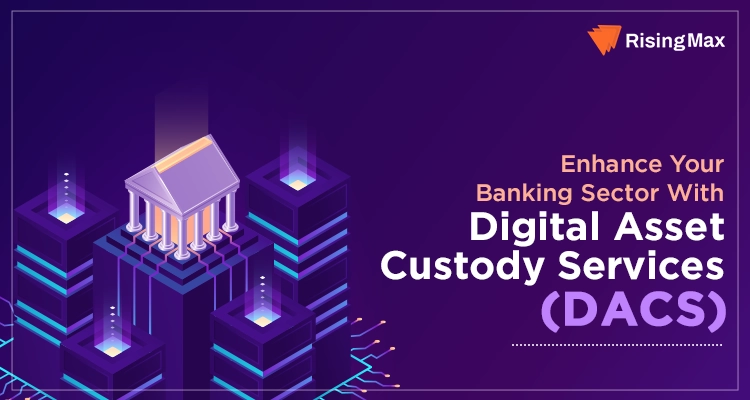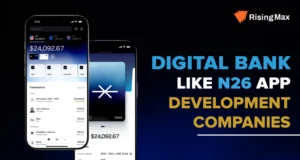The financial services industry is in the middle of a global transformation to digital asset mainstream adoption, fueled by many converging dynamics.

A rising number of corporations and individual investors see the significance of digital assets like cryptocurrencies and want to possess them. This puts financial institutions under pressure to assist them.
However, for digital asset trading to take off, investors must feel secure. This means that the future envisioned by major financial institutions is built on a digital asset custody basis, which is why these converging trends are driving the demand for crypto custody providers who can meet the needs of both institutional and individual investors. This is not a frivolous concern: In recent years, crooks have stolen at least $15 billion in cryptocurrencies.
Provide digital assets custody for cryptos like Bitcoin and ETH. RisingMax Inc. assists custodian banks and investment management businesses in developing unique custody solutions with extensive features, functionalities, and integrations with current systems that fulfill high security and regulatory standards.
What Is Digital Asset Custody Service?
If you want to comprehend custody in the modern day of digital assets, you must look at it through the lens of traditional capital markets.
Custodians are fundamentally institutions that provide a variety of financial services such as trade communities, business execution, clearing, and trade exchanges. However, the primary job of a custodian is to protect the assets of investors.
They act as vaults for investors’ assets, both digital and physical, and charge owners a fee for the secure preservation of their holdings.
Conventional asset custodians enter into agreements with investors that state that the assets will be held temporarily in the custodian’s custody. With a simple request to the custodian, investors may simply retrieve their funds.
Most importantly, custodians use their market knowledge and abilities to decrease the risks of theft, loss, or fraud.
As a result, an increasing number of financial institutions, including major banks, exchanges, and other financial services providers, are attempting to provide investors with the opportunity to securely store, acquire, and sell digital assets.
These custodial services necessitate the use of specialized technology that combines high security with speed, scalability, and operational flexibility. Because the availability of these services will stimulate further investment in digital assets, digital custody offers are important to the continued growth of cryptocurrencies and all digital assets.
Digital Assets Custody Importance
Most importantly, custodians use their market knowledge and abilities to decrease the risks of theft, loss, or fraud.
As a result, an increasing number of financial institutions, including major banks, exchanges, and other financial services providers, are attempting to provide investors with the opportunity to store, acquire, and sell digital assets securely.
These custodial services necessitate the use of specialized technology that combines high security with speed, scalability, and operational flexibility.
Because the availability of these services will stimulate further investment in digital assets, digital custody offers are important to the continued growth of cryptocurrencies and all digital assets.
The growing interest in digital assets has fueled the expansion of custody choices. Various types of custody possibilities have evolved as the market grows. New providers strive to build the structures and controls that are most effective in their markets and for their offerings.
Digital Assets Custody Offering Crypto
Investing in cryptocurrencies is a significant move for any organization, whether crypto-first or traditional. It has distinct operational, marketing, and security challenges: the technology is new, the regulations are ambiguous, and the risk is seen to be greater than that of regular securities investing. While the cryptocurrency market has expanded over the last decade to include dozens of assets appealing to professional-grade investors, custody remains a first-order barrier to institutional involvement.
Faced with this uncertainty, crypto-first institutions may be forced to self-custody their crypto assets. Institutions that are new to crypto, on the other hand, may already have custodial services but are unsure how to address a net-new asset class with whole new security issues.
Furthermore, unappealing vendor options may require institutions to make trade-offs between security, asset availability, and trustworthiness, restricting their capacity to make big crypto investments.
This is where Digital Asset Custody comes in to play a critical part in resolving those difficulties and increasing digital asset acceptance and Blockchain usage in general.
Risingmax Inc. provides free consulting to startups and businesses. Don’t pass up this opportunity to keep your toes in decentralized technology to deliver services to a worldwide audience.
Digital Asset Custody Services Workflow
Wallets can take numerous forms, storing and securing keys in a variety of ways and often employing access controls such as passwords or passcodes. Some wallets are intended to hold only one cryptocurrency, although many may hold numerous assets.
Custodian wallets maintain the keys on behalf of the owner. In some custody arrangements, the owner may not be aware of or have direct access to the private keys.
If the owner forgets their password, the custodian can authenticate their identity and allow them to restore access without losing their digital possessions.
Owners who wish to handle their own digital assets rather than rely on a custodian may employ a personal wallet, such as a hardware device that keeps their keys. This provides users more power over the keys, but it also increases their obligation to keep those keys, as well as their password, safe from loss or theft.
Align the current state of IT with your business strategy by hiring the most trustworthy Blockchain Development Company
Advantages of Digital Asset Custody
The following are some of the advantages of employing a crypto custody provider for investors:
Simplicity
Individual investors do not need to be concerned about tracking and preserving private keys because the crypto custody provider does so for them. This becomes increasingly significant as an investor’s portfolio becomes more complicated, maybe involving more frequent transactions and/or multiple digital assets.
Efficiency
This ease of use translates into increased operational efficiency for institutional investors. A portfolio of digital assets requires less time and effort to manage.
Greater Security
Financial services businesses have the resources and experience to deliver highly secure custody solutions that guard against hackers and internal misuse.
Reduced Risk
Crypto custody providers, in addition to providing improved security, can lower investors’ risk in other ways. Some providers are authorized by their local governments to function as digital asset custodians.
To get a license, providers must normally take efforts to protect the assets of investors from theft, loss, and illegal use. Major providers may also have insurance to cover any losses caused by theft or other factors.
Competitive Advantage
The competitive advantage provided by outsourcing digital asset custody is one of the most important benefits. Digital assets are benefiting more consumers, and companies who cater to individual digital asset investors or intend to enter that market can benefit from digital asset custody.
Outsourcing digital asset custody can also assist firms in diversifying their portfolio with a diverse range of digital assets while lowering the risks of their trades. Organizations may attract investors and ensure long-term growth and stability by leveraging digital asset custody.
Types of Digital Asset Custody Available to Your Users
There are various approaches to securing your assets in the expanding realm of private key and digital asset storage. In this section, we will look at two of the most frequent types of digital asset storage, self-custody, and third-party custody, and compare the benefits and drawbacks of each solution.
Hot Storage
Because of their ease of usage, hot storage wallets are a popular self-custody alternative for regular crypto traders. This solution, as an internet-connected application, allows you to rapidly make crypto transactions or interact with decentralized applications (dApps), similar to how you can spend cash in your wallet at a store.
While internet connectivity makes it much easier to access your cryptocurrency, it also increases the risk.
Cold Storage
Cold storage refers to Bitcoin storage in which private keys are not immediately accessible over the internet. The hardware wallets from Ledger are a fantastic example of a self-custody, cold storage solution.
Cold storage is analogous to holding your money in a personal safe in our monetary comparison. Cold storage solutions give protection by being removed from the internet, just as a safe can prevent money from being taken from your own person. The disadvantage of this option is that you must get your digital assets back online before using them, which can be a time-consuming procedure.
To spend your digital assets from a cold storage wallet, for example, you would need to connect your keys to the internet and then send a transaction; similarly, to spend your fiat, you would need to take it out of the safe and visit a store to purchase something.

Third-Party Custody
- Large organizations, such as institutional investors and hedge funds, have more complicated digital asset custody requirements.
- These major participants require a robust security solution that entails more than just a login and password to access the assets.
- Because of the intricacies of cryptocurrency, institutional investors resort to crypto custodians. Custodian services will retain and protect the client’s cryptocurrency funds for a fee.
- Custodians must provide top-tier cybersecurity and tiered levels of authorization in order to be relevant to a crypto whale.
- Custody services frequently utilize a combination of “hot” and “cold” wallets.
Conclusion
Finally, it is undeniable that the digital asset custody business will expand significantly in 2022. Digital custody solutions provide private key storage, allowing for greater control and transparency over the provenance and security of digital assets. However, the issue of ways to control private keys is critical for the long-term viability of digital custody systems.
Hire RisingMax Inc. to create a digital asset custody system with advanced security and unbreakable programming methods. Risingmax Inc. offers blockchain-based projects free consultancy services. This is an excellent opportunity to enter the decentralized and high-end world of blockchain technology.











